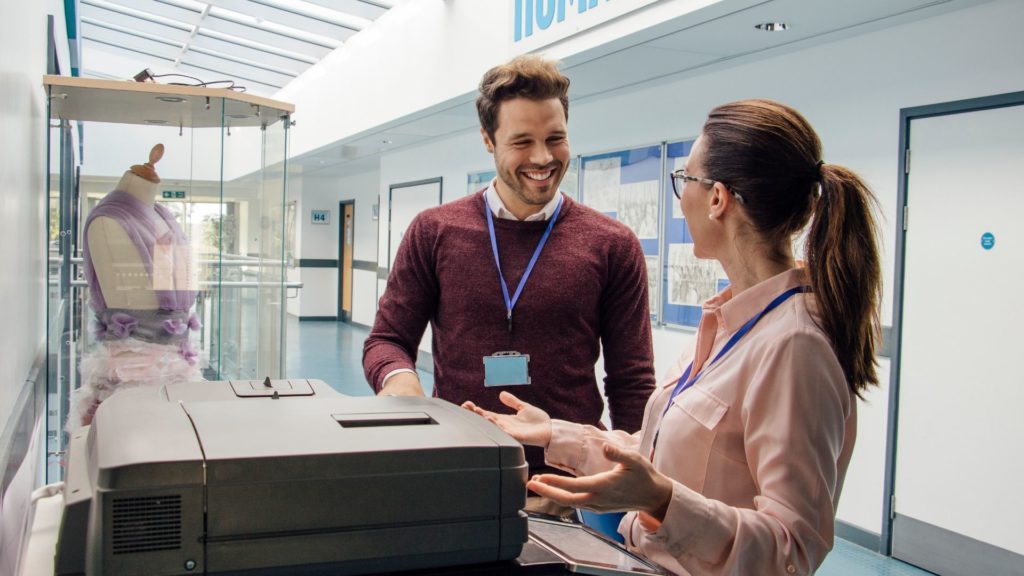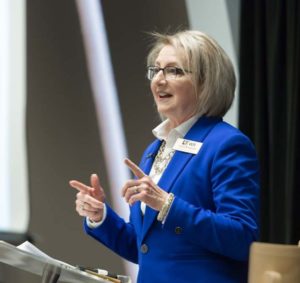Recently, we reached out to Rachel Wagner about etiquette for a modern workplace. With hundreds of members, we know it can be intimidating to jump into a coworking/business center atmosphere with different work styles. In part one of this two-part blog series, Rachel shares some great tips for success in a coworking environment.
What do you think are the rules to success for several remote (or freelance) agents working in a coworking atmosphere?
Think of the same rules of success in a regular office environment. Show respect and courtesy to everyone with your words and actions. Respect cultural and generational differences. Be mindful of how you dress (at least “business casual”), how you interact with others (not interrupting someone focused on their work, not “selling” your services, not talking too loudly, avoiding gossip). In other words, put your best foot forward in every area of “workplace” etiquette.

What is an appropriate way to network with the people in your coworking or business center without trying to “sell” them your services?
In a shared office space, there are usually dozens of other people using the space concurrently. It’s a great place to meet new professionals and expands one’s professional network. However, people are generally turned off by those who try to “sell” their services. Instead, people do business with those they know, like and trust. So first, get to know people at the business center. Start with a warm hello and handshake if you walk in together. Ask what the other person does; show interest in the other person first. Then, at some point this person will ask “What do you do?”

Also, it’s appropriate to introduce yourself to people at the coffee bar or shared kitchen. Again, ask about them first, what they do, what new initiatives or start-up they’re working on, etc. Keep the conversation brief as most people are there to work and you don’t want to detain them. After you’ve had a moment or two of conversation, ask if they have a business card and ask if you may give them yours (Tip: Never give a business card without permission!). So, you’ve “networked” briefly and when you see these professionals again a few days later in the hallway, you can have another brief greeting and ask, “How’s that initiative going?”

When you’re interested in others first, it helps build rapport. It’s a natural way to network versus approaching people to talk about yourself. You can also introduce yourself to others at happy hours and other events hosted by the business center.
What is an appropriate dress code when you work remotely at a business center?
Every business center has its own “culture” which may determine what attire is appropriate. But, since many business centers are located at prestigious addresses around the city, I recommend at least dressing “business casual.” You can never go wrong in business casual attire, even for the more creative types. Everyone has different interpretations for that term, so it is best described as focusing on attire that means business versus looking too casual.

For women, that may mean nice jeans (darker denim), dressy slacks, woven and knit tops, sweater sets and casual dresses. Generally, anything that gives the impression that you are there for “business.” Avoid anything too tight, too revealing or see through, too short or anything you might wear to the gym.

For men, “business casual” may include nice jeans (dark denim), dress slacks, Docker-type slacks, woven shirts and polo shirts. Avoid attire that is too wrinkled or better suited for the gym or playing sports. For both men and women, a blazer takes the business casual up a notch and conveys greater professionalism. Even though “distressed” denim is now the fashion, it would
not be considered business appropriate in most business centers and not impressive when meeting a client.

Another reason to dress in proper attire is that first impressions count; and you may just be introduced to someone at the business center who could be your next prospect, client, or a potential venture capitalist!

What are typical faux pas you see in a coworking environment?
Loud conversations – which are a distraction to others trying to get their work done. If you prefer to work in a more open communal workspace with high and low tables and soft seating (sofas), soft conversations with others are generally acceptable in this open environment. Everyone understands there will be some level of background noise in these areas. But, loud conversations are a distraction and discourteous to others. If your conversation tends to be livelier, it may be better to schedule a meeting room or conference room that are available in most business centers.
Using mobile phones in non-phone areas – If you need to make or receive phone calls (and you’re not at a dedicated desk in an enclosed office), it’s courteous to those around you if you use a designated “phone booth” or Skype room or even go outside the building. Somehow, calls always last longer than expected, so leave the no-talking area to take your call elsewhere.
Interrupting others who are trying to work – If someone is wearing earbuds, headphones or is working at a dedicated desk, this person is usually wanting to focus and work quietly without interruption. If someone is working in a designated “quiet room,” it indicates they want to work solo without interruption.
Leaving workspaces untidy – When there’s a mix of people using the same workspace, the desk can become a magnet for germs, trash and leftover coffee cups. Courteous solution: when you leave the workspace, push the chair in, tidy up and even consider running an antibacterial wipe over the desk surface.
Monopolizing the printer – Don’t plan to print 500 pages during peak hours; plan it for off-peak times if possible. The person who only needs one page printed will appreciate it!

How can remote-working millennials integrate into a business center with several different work cultures?
Work habits of Millennials generally include working together with others, collaborating, and finding support from a community of like-minded people. Millennials usually love to discuss their ideas and projects with others and get feedback. This means, they need to identify a coworking space/location that provides this type of community and culture versus a location that is designed for solo workers in private office spaces where “quiet zones” are more popular and the noise-level policy is more strict. They will also integrate better by identifying if their need is for a permanent desk or a hot-desk.
More about Rachel Wagner, Etiquette and International Protocol Consultant
 Rachel Wagner is a business etiquette consultant, trainer and speaker specializing in etiquette and protocol issues facing today’s business professional. Rachel is trained and licensed as a Corporate Etiquette and International Protocol Consultant by the renowned Protocol School of Washington® in Washington, D.C. She is the founder and president of Oklahoma-based Rachel Wagner Etiquette and Protocol. Armed with over two decades of experience as a teacher and workshop speaker, Rachel provides professionals with the business etiquette tools needed to communicate with confidence, presence and influence. You can learn more about her experience here.
Rachel Wagner is a business etiquette consultant, trainer and speaker specializing in etiquette and protocol issues facing today’s business professional. Rachel is trained and licensed as a Corporate Etiquette and International Protocol Consultant by the renowned Protocol School of Washington® in Washington, D.C. She is the founder and president of Oklahoma-based Rachel Wagner Etiquette and Protocol. Armed with over two decades of experience as a teacher and workshop speaker, Rachel provides professionals with the business etiquette tools needed to communicate with confidence, presence and influence. You can learn more about her experience here.